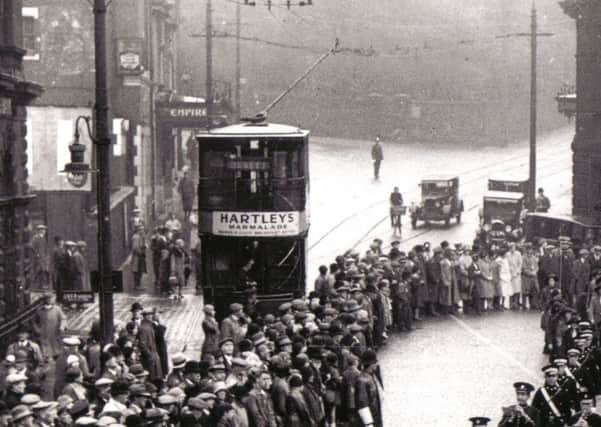NOSTALGIA: Government needed people to produce food


Little wonder when 1917 dawned – the third year of the war – no-one was predicting when it would end.
Tragically, it was to go on for another two years and millions more lives would be lost worldwide.
Advertisement
Hide AdAdvertisement
Hide AdDespite all the tragic circumstances surrounding them, nothing it seemed could dampen the patriotic spirit of the British people.
Even when it was revealed that the war was costing Britain seven million pounds daily, they continued to dig deeper still to raise more money for the war effort.
Staggering sums of money, most of it from the working classes, was raised in Dewsbury to help buy ships, planes, ambulances and tanks, one ship bought being named ‘HMS Dewsbury’.
Every single voluntary organisation in the town, every church, pub, club, school, mill, mine and factory, was raising money.
Advertisement
Hide AdAdvertisement
Hide AdBut shortage of money wasn’t the only problem facing the country.
Shortage of labour, especially in most agricultural areas, was now at a critical level.
Food stocks were at a low level, and with almost every able-bodied man in the country away fighting, there was a severe shortage of agricultural workers.
Early in 1917, a call went out to those still at home because they were regarded as being too old to fight or medically unfit.
Advertisement
Hide AdAdvertisement
Hide AdA voluntary scheme under the title “National Service” was launched by the Government appealing to men between the ages of 18 to 61.
They were asked to enrol on a register asking them to promise to help their country by going to work on the land.
Public meetings were held throughout the country, including here in Dewsbury and surrounding towns, at which the voluntary scheme was fully explained.
The people they needed were mainly gardeners, flower growers, outdoor servants, gamekeepers, hedgers and ditchers, and above all, ex-ploughmen and men who had worked on the land.
Advertisement
Hide AdAdvertisement
Hide AdHundreds of local men from this district attended the meetings to learn what was being asked of them and many answered the call.
Whatever job they undertook, they were guaranteed a minimum wage of 25 shillings a week.
Most of them would have been motivated to enrol after reading a letter in the Reporter from the Prime Minister, Mr Lloyd George.
He wrote: “Every time you buy food in a shop or eat it at a table say to yourself that our merchant sailors have died and are dying to bring it to you. It is bought not merely with money, but with blood.
Advertisement
Hide AdAdvertisement
Hide Ad“If you can use a spade, if you are good at gardening – go work on the land at once. Go to help replenish our dangerously low stocks.
“Go now while there is still time for the spring sowings to yield summer and winter food. In a few weeks it will be too late.
“It is essential for the safety of the Nation, for the maintenance of the Nation, for the life of the Nation, that we put forth immediately every effort to increase production for this year’s harvest and the next.
“The farmers could increase the food of this country by hundreds of thousands of tons this year but one of our main obstacles is lack of labour.
Advertisement
Hide AdAdvertisement
Hide Ad“Enrol today for National Service and help to defeat the grimmest menace that ever threatened this country”
Signed,
Lloyd George
l Rationing was not used during this period of food shortages but to ensure everyone was dealt with fairly, special food committees were set up.
Wholesalers and retailers and those running cafes and restaurants and institutions had to seek permission to increase rations where necessary.
When sugar became scarce, the use of sugar in cafes and restaurants was prohibited by the Ministry of Food .
Advertisement
Hide AdAdvertisement
Hide AdCaterers , in the preparation of meals, were instructed not to use more than one-and-a-half ounces of sugar per head in the preparation of meals for luncheons and dinners.
An application by a Dewsbury butcher for permission to sell from 20 to 40lbs of potted meat for consumption by wounded soldiers at the hospital in Staincliffe was granted.
The Dewsbury Food Committee also granted an application by a local meat company to sell 400 pounds of meat, over and above the weekly ration, to feed the large number of local soldiers on leave that week.
The system of dealing with food shortages was time consuming and forms of every description had to be completed before extra rationing was given out.
Advertisement
Hide AdAdvertisement
Hide AdInvalids requiring extra flour had to apply to the Scientific Advisers Department of the Ministry of Food for an official form to be sent to them to complete.
And if they also required an extra supply of sugar, they had to apply to the Sugar Department of the Ministry of Food.
If extra milk was needed a third application had to be made to the Milk Priority Department, and so it went on. One application turned down by the Dewsbury Food Committee was to someone who wished to serve refreshments at a local whist drive.